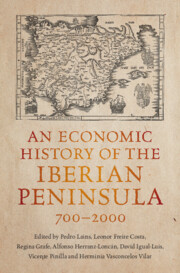Book contents
- An Economic History of the Iberian Peninsula, 700–2000
- An Economic History of the Iberian Peninsula, 700–2000
- Copyright page
- Contents
- Figures
- Tables
- Contributors
- Preface: By Way of Presentation
- Introduction
- Part I The Making of Iberia, 700–1500
- Part II Globalization and Enlightenment, 1500–1800
- 10 Patterns of Iberian Economic Growth in the Early Modern Period
- 11 Population of the Iberian Peninsula in the Early Modern Period: A Comparative and Regional Perspective
- 12 Institutions and Policy, 1500–1800
- 13 Early Modern Financial Development in the Iberian Peninsula
- 14 Science, Knowledge and Technology, 1500–1800
- 15 Living Standards, Inequality and Consumption, 1500–1800
- 16 Trade and the Colonial Economies, 1500–1828
- 17 The Economic History of Iberia in a Wider Context, 1500–1800
- Part III Industrialization and Catching Up, 1800–2000
- References
- Index
11 - Population of the Iberian Peninsula in the Early Modern Period: A Comparative and Regional Perspective
from Part II - Globalization and Enlightenment, 1500–1800
Published online by Cambridge University Press: 22 February 2024
- An Economic History of the Iberian Peninsula, 700–2000
- An Economic History of the Iberian Peninsula, 700–2000
- Copyright page
- Contents
- Figures
- Tables
- Contributors
- Preface: By Way of Presentation
- Introduction
- Part I The Making of Iberia, 700–1500
- Part II Globalization and Enlightenment, 1500–1800
- 10 Patterns of Iberian Economic Growth in the Early Modern Period
- 11 Population of the Iberian Peninsula in the Early Modern Period: A Comparative and Regional Perspective
- 12 Institutions and Policy, 1500–1800
- 13 Early Modern Financial Development in the Iberian Peninsula
- 14 Science, Knowledge and Technology, 1500–1800
- 15 Living Standards, Inequality and Consumption, 1500–1800
- 16 Trade and the Colonial Economies, 1500–1828
- 17 The Economic History of Iberia in a Wider Context, 1500–1800
- Part III Industrialization and Catching Up, 1800–2000
- References
- Index
Summary
This chapter analyses the demographic dynamics in Iberia between 1500 and 1800, in a regional and European perspective, comparing the pattern of population growth, demographic distribution, urbanization and socio-professional composition of the population of the Iberian Peninsula with that of the rest of Europe in the same period. The first section reconstructs the trajectory of the total population for both Iberian countries in order to set the national trends, and to compare these trends of growth with other European countries. It also focus on population distribution across regions and highlight regional differences. Attention is paid to the prevailing “demographic system in both Iberian kingdoms, and to the available data on emigration especially towards the colonial areas. The second section offers an overview of Iberian urbanization between 1500 and 1800. The analysis of the urban dynamic takes into account not only the percentage of the total population living in urban areas (the urbanization rate), but also the morphology of the urban structure. Finally, the third section shows an overall picture of the socio-professional composition of the population in both countries.
Keywords
- Type
- Chapter
- Information
- An Economic History of the Iberian Peninsula, 700–2000 , pp. 278 - 309Publisher: Cambridge University PressPrint publication year: 2024



